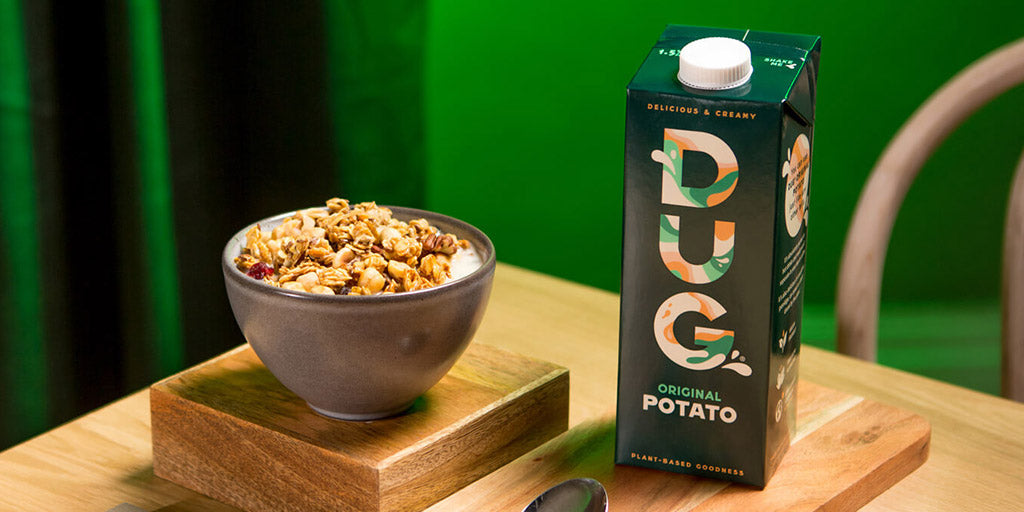
Does Potato Milk Taste Good? Know Its Recipe & Nutritional Value
Share

It seems like practically every plant-based item is being transformed into "milk" these days, with potato milk being the most recent example.
Potato milk is a kind of plant milk derived from potatoes. The texture is milky, and the flavor is subtle. A Swedish food researcher and a professor at Lund University discovered a technique to transform the common potato into a potato drink. Potato milk is now being sold in a few countries by the Swedish business DUG. It's made up of water, potatoes, rapeseed oil, carbohydrates, and a few additional things including an emulsifier, vitamin D, and an acidity regulator.
It's no surprise that potatoes were picked as the next plant-based milk. After all, potatoes offer several health advantages due to their high concentration of essential vitamins and elements. But how do they fare in comparison to other popular plant-based kinds of milk? Regardless of the type of plant-based milk, it only contains a percentage of the substance from which it is made. Only 10% of the volume of a carton of rice or oat milk, for example, is derived from these grains. Soy beverages include between 5% and 8% of the real soya bean, whilst almond milk contains as low as 2% of the actual nut.
Because coconut uses the cream or milk from the fruit, it includes anywhere from 5% to 13% fat, depending on how creamy the product is. And, according to the current potato milk products on the market, a one-liter carton includes just around 60g of genuine potato — a little potato.
Potatoes already have a low protein content. This implies that after processing, potato milk has around the same amount of protein as coconut and rice milk - less than 0.5g of protein per 100ml. However, some potato milk brands do include pea protein, making a 100ml serving contain about 1.3g of protein.

How To Make Potato Milk?
To get a flawlessly smooth texture, you will need a liquid for this recipe. If you use too much water, the taste will be muted and slightly unpleasant. If there isn't enough water, the texture will be too thick. You may utilize the water from which you cooked the potatoes to produce a deliciously warm drink that also has some extra nutrients.
A touch of salt might help to balance out all of the tastes.
The store-bought potato milk contains 6% potatoes as well as a lot of oils and sugars. A supply of fat is not only an excellent method to provide extra nutrients, but it may also improve texture and flavor.
To counteract the dull flavor, a sweetener is required. Once you've determined the ideal quantity of sweetness for your recipe, stick to it. It's rather personal. Coconut sugar, date syrup, stevia, xylitol, and white/brown sugar are a few examples.
Once all of the ingredients have been combined in a powerful blender like the Acekool Blender BC2, it is critical to strain the fiber from the mixture to get a smooth and rich texture.
Ingredients
- 260 gram / 1 ½ cup raw peeled potatoes
- 3 ½ cup water
- 1–2 tbsp almonds (ground almonds)
- pinch salt
- 4 tbsp maple syrup
- optional: vanilla
Instructions
- To remove the skin from the potatoes, peel them.
- Boil the potatoes until they are tender. They should still be soft, but not crumble. Check that they are not raw. Cook for around 15 minutes, depending on the size of the potatoes.
To make warm potato milk
- Store the cooking water from the boiling potatoes.
- Blend the potatoes with the saved cooking water in a blender. If you haven't drained the potatoes and don't have 3 1/2 to 4 cups of water, add some extra fresh water.
To make cold potato milk
- The potatoes should be drained.
- Add the drained potatoes and new cold water to a blender.
- Start with a little amount of water and work your way up. A total of roughly 3 1/2 cups should be enough, but if you want a thinner texture, 4 cups may be preferred.
- Add the other ingredients to the blender as well. Blend in the salt, vanilla, almond, and sweetener for around 5-7 minutes. Using a nut milk bag or cheesecloth, strain the mixture.
Potato milk is yet another choice for individuals searching for an alternative to cow's milk or other plant-based milk, or a more ecologically friendly milk product. Although it lacks the protein of soya milk, potato milk still contains key vitamins and minerals.
